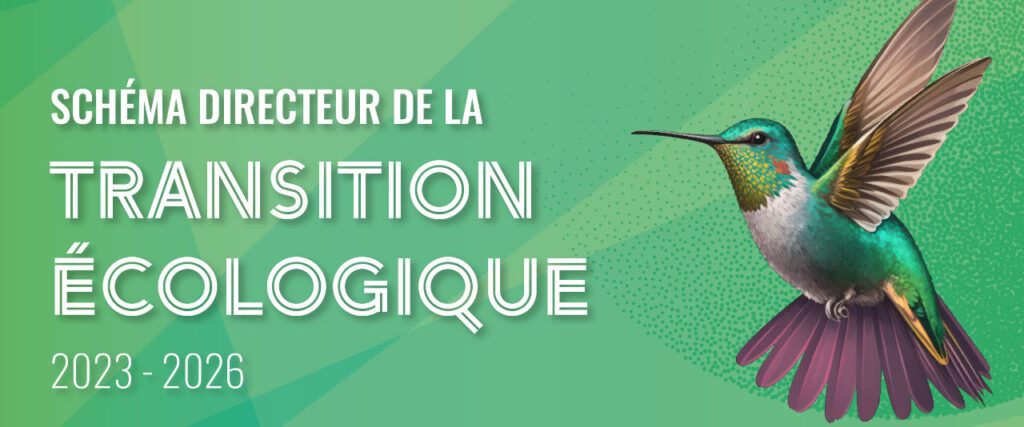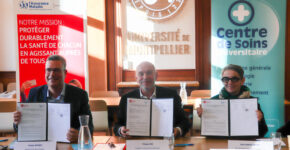Ecological transition
On November 20, 2023, the University of Montpellier voted on its master plan for ecological transition. This is a key document that will reinforce the measures already put in place in recent years at the University of Montpellier, but also commit to and coordinate the implementation of an ecological transition policy that matches its ambitions. A brief presentation of its development with Frédérique Carcaillet, Vice President for Environmental Issues.

In 2022, for his new term of office, President Philippe Augé wanted to appoint a vice president dedicated to environmental issues, a cross-functional vice presidency in nature, given that environmental issues concern the university not only as an educational, research, and innovation institution, but also as a consumer of resources and a player in the development of the region to which the university belongs. An administrative and operational support office dedicated to the institution's ecological transition has also been created.
"The first year of my vice-presidency and the office's operation allowed us to take stock of the steps already taken by the university over several years in terms of ecological transition. It also allowed us to define the scope of the future master plan and to structure the decision-making and operational mechanisms that are essential for achieving the university's objectives."
Two committees have been set up: a steering committee tasked with making proposals and monitoring the implementation of the institution's ecological transition policy, and an operational committee responsible for monitoring the implementation of the action plan and reporting to the steering committee.
"After developing the broad outlines and main actions of the master plan based on the national SD&SR framework and as part of the ministry's climate and ecological transition plan, we launched a consultation within the institution to identify the needs and ideas for action of the various structures. This enabled us to complete our action plan and define the indicators to be monitored to ensure the smooth running of the master plan."
In a structure such as UM, which brings together 17 faculties, schools, and institutes, one component institution, and more than 70 research laboratories, a major challenge was to improve the institution's ability to engage the entire community in the processes of transforming and developing its ecological transition strategy. The network of ecological transition correspondents was created to meet this need.
"This network allows us to involve the entire community in the implementation of various initiatives. It comprises more than a hundred people who relay information relating to ecological transition and share best practices between the various structures within the institution."
2025 is the year of the mid-term review of the UM's ecological transition master plan, a key milestone for taking stock of the momentum built up since 2023 and for starting to think about the UM in 2030!
Presentation of the Ecological Transition Master Plan (SD TE)
The University of Montpellier has anticipated the requirements of the Ministry of Higher Education and Research terms of ecological transition by adopting its Ecological Transition Master Plan (SDTE) in 2023, structured around four areas and 48 actions to be carried out by 2026. Actions relating to social responsibility are not included in this plan: already developed and in the process of being rolled out, they are included in other multi-year documents (master plans for disability and student life, gender equality plan, etc.) which have their own visibility.

Axis 1: Education and training, "Training students and staff in ecological transition"
Main objectives:
- Integrate issues related to ecological transition and sustainable development into teaching
- Promoting and supporting the development of staff skills in ecological transition
- Encouraging student engagement in the ecological transition and its promotion
To achieve these objectives, 11 actions have been planned, including the introduction of compulsory modules on ecological transition for undergraduate students, the provision of educational resources for students and teachers, the installation of technology demonstrators on campuses, and the development of specific training modules for staff.
Axis 2: Research innovation, "Promoting responsible research in support of ecological transition"
Main objectives:
- Integrating ecological transition into research and innovation at UM
- Increasing interactions between science and society
The aim is to encourage laboratories to engage in more responsible research by promoting the sharing of best practices through seminars and a network of committed advisors, establishing selection criteria for internal projects, and providing the data necessary for laboratories to conduct self-assessments of their environmental impact. Emphasis has also been placed on strengthening the relationship between science and society and the importance of the role of scientists in public policy.
Axis 3: Environment, "Taking action for the environment and changing behaviors"
Main objectives:
- Reducing UM's carbon footprint
- Reducing and managing waste
- Protecting and promoting biodiversity
To achieve these objectives, the action plan provides for extending energy rehabilitation operations on buildings and connecting them to district heating networks, developing the use of renewable energies, promoting soft mobility, and conducting an assessment of its greenhouse gas emissions. It also involves taking action to better understand and increase biodiversity on campuses by practicing "zero pesticides," "zero watering," late mowing and pruning, and raising awareness among users. Another key point of this plan is waste management: promoting reuse and recycling, particularly for IT equipment, office furniture, and packaging, and reducing waste production.
Axis 4: Strategy and governance, "Building governance for ecological transition and promoting responsible business practices"
Main objectives:
- Integrating ecological transition policy into UM management
- Mobilize the necessary human, technical, and financial resources
- Adopting a responsible development approach that balances economic, social, and environmental considerations
Tools for managing and monitoring the implementation of various actions are necessary in order to allocate human, technical, and financial resources in the most effective way possible. This involves creating committees and a network of representatives, known as "ecological transition correspondents." These correspondents will evaluate and analyze the performance of the initiative and serve as a valuable source of information for communicating, raising awareness, and promoting commitment and support from all parties. In order to strengthen the implementation of the SDTE and embed the culture of TE in all of the institution's activities, the UM integrates ecological transition issues into all aspects of its responsible purchasing policy.



